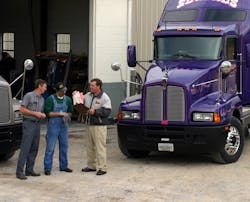All around the United States, many companies – not just in trucking – are under increased scrutiny about classifying workers as independent contractors instead of employees.
Trucking in particular, however, has been singled out as an industry in which misclassification is pervasive. A report from the Economic Policy Institute last year noted that since deregulation in 1980, the industry has made heavy use of self-employed drivers or independent contractors, but these drivers are still being managed, directed and assisted by the hiring carrier and thus are misclassified.
Court settlements can be costly. Last month, the California Labor Commissioner ruled that 38 drayage drivers for Pacific 9 Transportation were misclassified as independent contractors and awarded them almost $6.9 million in back wages. In October, a court approved a $228 million settlement against FedEx for misclassifying more than 2,000 workers.
States are cracking down partially in response to a Department of Labor memorandum published in July that emphasizes the federal government's criteria known as 'the Economic Realities' test for job classification.
Take the test to define your driver
"The Economic Realities Test has been out there for a couple of decades, but states now are picking it up," says Todd Wulffson, the managing partner of the Orange County Office of Carothers, DiSante & Freudenberger in Los Angeles, a California-wide labor and employment law firm representing employers. About half of states are incorporating the federal guidelines into their own laws and more are expected to follow. He notes that the more states sign on, the easier it will be for multi-operating states companies, like truck carriers, to be in compliance because the rules will be uniform.
Wulffson says that many companies understand the law but purposely misclassify workers because it means more money in their pocket.
"They’re choosing to take the path of least resistance and highest profitability. That’s the reality. The typical employment law does not say 'you can’t do this on pain of death or on pain of losing your company,'" he says. "If your chances of getting caught are extremely low, and the damages from being caught are extremely low… and on the opposite side of the equation, you can make a whole lot of money by not doing the conservative approach legally, most companies are choosing to make more money."
He estimates that companies who classify workers as independent contractors don’t have to pay payroll taxes, workers' compensation, reimbursement for expenses, sick days or health insurance among other savings. "If you’re paying someone $60,000 a year and you had to provide them with benefits, now you're paying about $80,000 a year. If you keep them as an independent contractor, you’re saving $20,000."
Some states have upped the penalties, however, in an effort to force compliance. "In California, if you're found to have misclassified an independent contractor, you have to post on your web site, or other publicly available places where your company name is, that you misclassified people. You're basically inviting every plaintiff’s lawyer out there to sue you. That’s a pretty big threat. Consequently, more companies are choosing employees over independent contractors now in California, because of that threat. In order to get people to shift their activity, you’ve got to increase the penalties, and that’s what California has done," says Wulffson.
He advises that the most important point in deciding a workers classification is how truly independent they are. His best advice to trucking firms? "Have someone who is trained in the area to take a look at your situation," Wulffson says.
He concludes: "An independent contractor is told: 'I want you to do X, and I don’t care how you do it. Just get it done.' Whereas, with an employee, you say: 'I want you to use this truck. I want you to drive I-40. I want you to make sure that you stop at only Days Inns because we have a relationship with them.' That’s the essence of the Economic Realities Test."
About the Author

Larry Kahaner
Larry Kahaner is an author, journalist, and former FleetOwner contributor.
